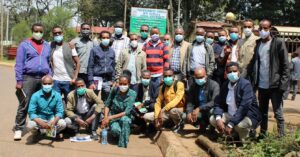Executive Summary
 United States Agency for International Development (USAID)/Ethiopia contracted Tetra Tech as the prime contractor to implement the five-year, $10.9 million Land Governance Activity (USAID LGA) Task Order (TO) under the Strengthening Tenure and Resource Rights (STARR) II Indefinite Delivery Indefinite Quantity (IDIQ) Contract. Tetra Tech will implement USAID LGA over a five-year period commencing May 24, 2019 (effective date per Section F.2 of the TO contract).
United States Agency for International Development (USAID)/Ethiopia contracted Tetra Tech as the prime contractor to implement the five-year, $10.9 million Land Governance Activity (USAID LGA) Task Order (TO) under the Strengthening Tenure and Resource Rights (STARR) II Indefinite Delivery Indefinite Quantity (IDIQ) Contract. Tetra Tech will implement USAID LGA over a five-year period commencing May 24, 2019 (effective date per Section F.2 of the TO contract).
The goal of USAID LGA is to assist the Government of Ethiopia (GOE), its regions, and its citizens in strengthening land governance, increasing incomes, reducing conflict, and supporting well-planned urbanization, thereby contributing to the country’s Second Growth and Transformation Plan. To help achieve these goals, USAID LGA will work in close partnership with relevant institutions in the GOE, Ethiopian universities and research institutions, and other development partners operating in the land sector to implement activities under two components:
Component 1: Strengthening the land governance system
1. Facilitate policy reforms and strengthen land administration and land use institutions by promoting structural reforms of rural and urban institutions and the land information system.
2. Improve technical capacity for suitable land administration and land use planning activities to address emerging issues, such as urbanization, industrialization, and youth.
3. Conduct policy-oriented research on land governance and provide scalable solutions to improve land governance.
Component 2: Expanding communal land tenure security in pastoral areas
1. Expand communal land tenure security in pastoral areas through improved policy and legal reform.
2. For pastoral community lands, develop a scalable approach for land demarcation and certification in collaboration with community institutions.
USAID LGA commenced implementation on May 24, 2019.
Fiscal Year 2021 proved to be very challenging with the evolving COVID-19 Pandemic, widespread insecurity caused by conflicts in different parts of the country, and the national election that was postponed twice. The cumulative effect of these events was to delay implementation of LGA’s interventions, particularly those designed to expand communal land tenure security in pastoral areas under LGA’s Component 2 (please see Section 3.2 below) that required field work in Afar, Oromia and Somali national regional states (NRSs). To mitigate the impact of these delays, LGA staff travelled as frequently as the security situation would permit to these three NRS to prepare the foundation for implementing interventions to help strengthen land rights of pastoral communities. This included preparation of draft regional legislation that was not passed into law, mainly due to issues connected with the national elections. Additionally, the national integrated land use policy and the federal proclamation to amend the Land Administration and Use Proclamation No. 456/2005 are still pending at the Council of Ministers because the GOE deemed it would be more appropriate to deal with them after June’s national election was completed. This derailed the plan to assist NRSs to amend their laws to comply with the amended federal proclamation. Preparations for a pilot to introduce appropriate, “fit-for-purpose” technologies and streamline and improve urban land rights adjudication and registration processes were less affected. Training of GOE land bureau staff at the diploma and M.Sc. levels to build their capacity to implement legal and institutional reforms and deliver improved land administration services was conducted on schedule.

